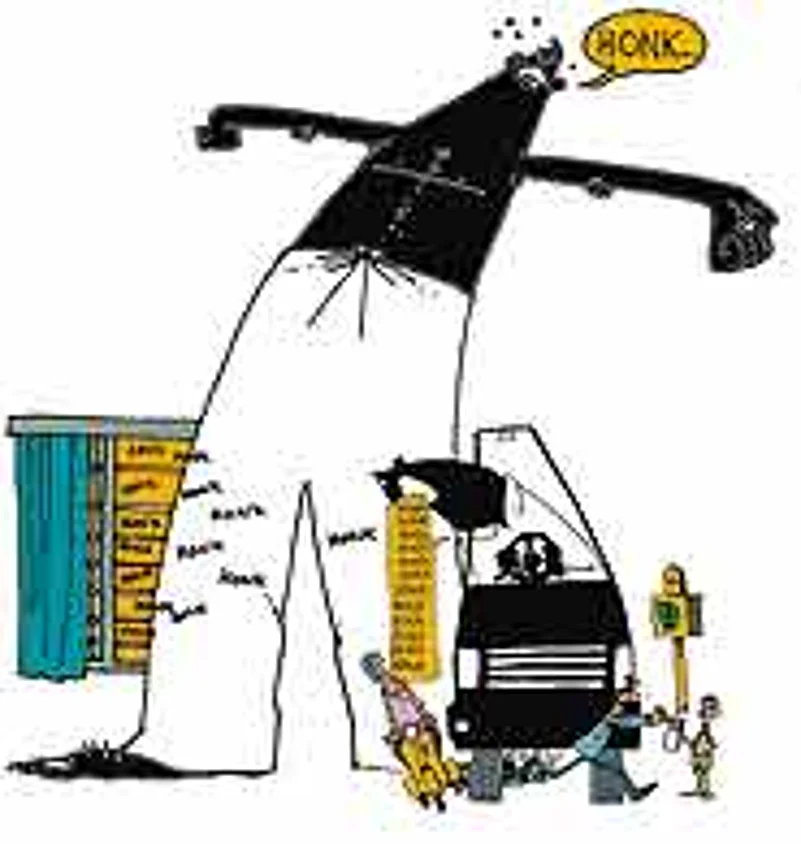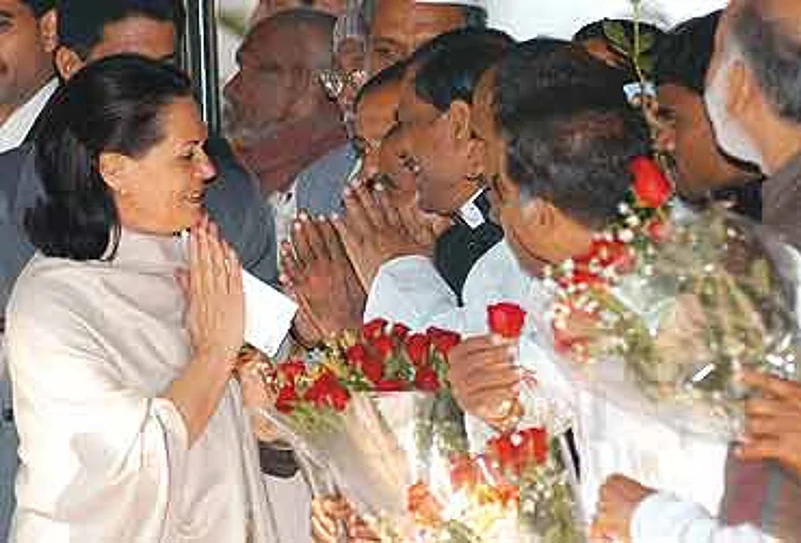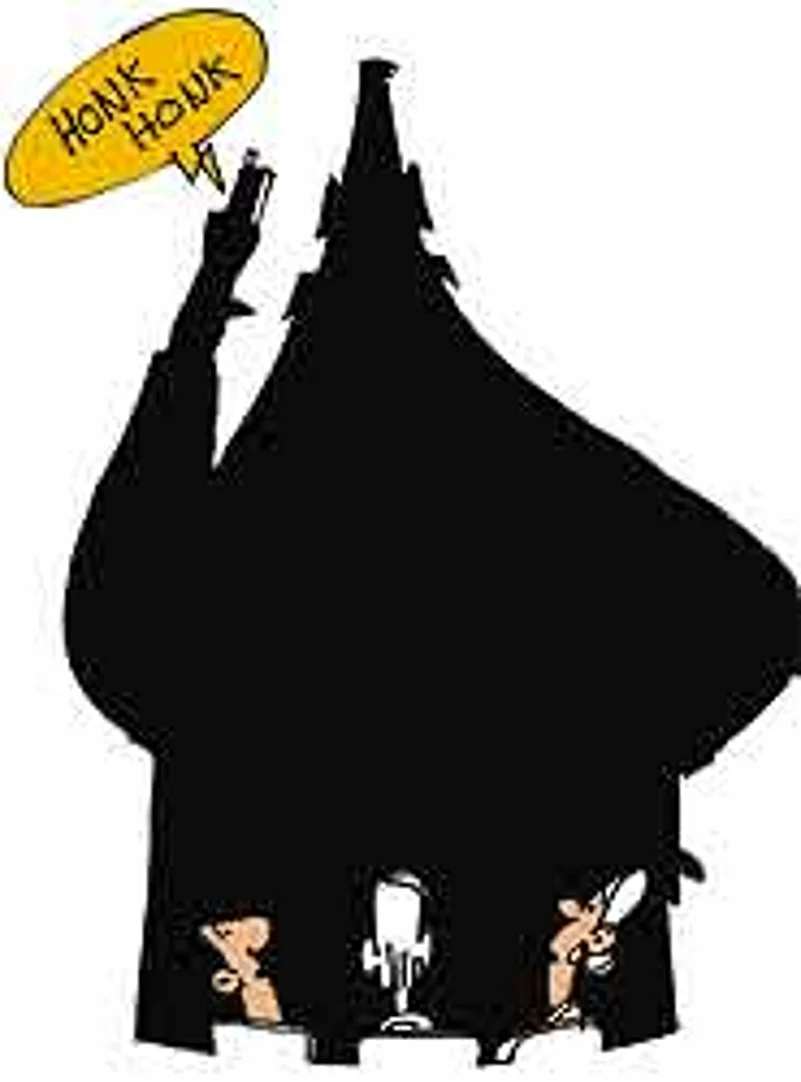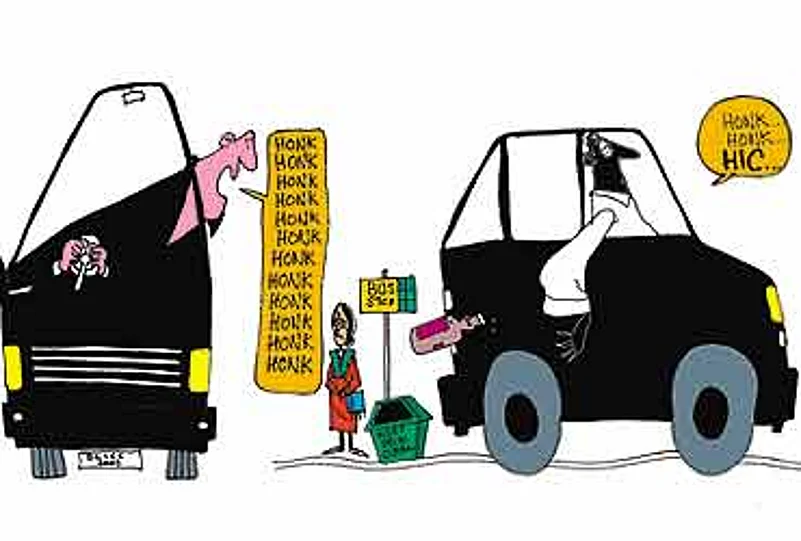Delhi's Seven Deadly Sins
1 Aggressive, lawless driving; India's road accident capital
2 Touting, hustling culture, grab-what-you-can-get mentality: law-breaking acceptable across classes, everything 'negotiable'
3 Callousness towards the vulnerable: disabled, visitors, elderly, poor
4 Most unsafe city in India for women; India's rape capital
5 Obsession with hierarchy & status
6 Officious, self-important political and bureaucratic class
7 Appalling cultural and professional manners
Some things about Delhi have got better, whether it’s thanks to initiatives by the courts, greater prosperity or the drive to create a showpiece city for the Commonwealth Games 2010
- Improved air quality, lower pollution levels
- Abundant greenery and increasingly well-maintained parks
- Some hope for its crippled public transport system with new Metro, new buses
- Growing corporate, cultural, educational hub
- Vibrant, throbbing city with explosion of choices for food, shopping, clubbing
- Improved housing options, with satellite towns Gurgaon, Noida slated to get well connected
"Delhi’s grown from sleepy town to metropolis, incorporating a rural population of independent and aggressive small landholders over whom the urban influence is still very shallow.... Delhi is also the seat of power; everything here is a power play...negotiable and up for grabs. Even among the educated, who’ve been to the right schools, the first instinct is to break the law."
Dipankar Gupta
Sociologist
"Delhi does not inspire the loyalty other cities like Mumbai or Calcutta do. Is it because this city does not have a soul? Survival of the fittest seems to be its mantra and women face the brunt of this. For them, everyday life in this city is
tempered by the fear of violence. The added flavour here is that no one is willing to raise their voice to help another person."
Kalpana Viswanath
Women’s rights activist
‘"Contemporary life in great cities is documented in close, loving, obsessive detail by writers and by filmmakers, its neighbourhoods are invested with magic, not just for those who live in them, but a wider world beyond. That has happened to London, to New York, to Mumbai, to Calcutta, but not to Delhi. We need to ask ourselves why."
Mukul Kesavan
Writer, Historian
"This is a selfish city, with very little courtesy. You have to have sharp elbows to drive here. Unless you eat up every single inch of the road, you don’t get anywhere. And you have to steel yourself to a hundred incivilities.... In a cafe in Saket, as I held the door open for a family that was leaving, a woman behind me pushes past all of us, and walks out...."
Andrew Whitehead
Director, BBC World Service Trust
Alok Sikka has a scooter, a Kinetic Honda with two extra wheels to help him maintain his balance while he is riding. One evening, one of his crutches fell off the scooter, and he took an ill-judged turn to retrieve it, causing an accident. Alok, who suffers from cerebral palsy (brain damage affecting mobility and speech), tried to apologise, in his slow, laboured drawl, but to a deaf and violent Delhi street. Cops and enraged motorists joined hands to brutally beat up the young man. Today, he is back on his scooter, and his intelligence and fighting spirit put his city to shame. He explains succinctly why its citizens refuse to sell him a Coke, or why he has to argue to buy a ticket for Rang de Basanti: "Here, speech problem equals mental retardation. The attitude is: why has this fellow come to my shop? Why doesn't he stay at home?"
Alok's encounters with Delhi are a reality check, at a time when accolades for the rising capital of a rising country are flowing fast and thick. Not just political mecca, but, oh gosh, fashion capital, rival commercial capital, resurgent cultural capital, big-spending consumption capital, home to more crorepati families than any other metro, gastronomic hub, growing magnet for migrants rich and poor, proud owner of a gleaming new Metro and smart new buses; "world city" marching proudly towards the Commonwealth Games in 2010.
It is probably true, every word of it, but triumphalism and smugness are threatening to mask the reality of what Delhi also is: harsh, cruel, inhospitable for those who don't have the money, survival skills or connections to deal with its grab-what-you-can-get mentality, its obsession with hierarchy and status, its web of client-patron networks. Are we also losing sight of how uncouth it still is, under a veneer of cool, compared to metros with a more settled urban culture such as Mumbai and Calcutta? As writer and illustrator Manjula Padmanabhan puts it, "If cities were people, Delhi would be an unshaven bully. A wife-burner. A drunk. A road-hog."

"World-class city? Is that just flyovers, tall buildings and the Metro?" asks Kalpana Viswanath of the women's group, Jagori. "Delhi is the most unsafe city for women in India," she says. Among 35 megacities (those with a population of over 10 lakh), Delhi generated 30.3 per cent of all rapes, 33.3 per cent cases of kidnapping and abduction, 19.8 per cent of all dowry deaths, 18.3 per cent of all molestation cases in 2004. Testosterone runs riot in other ways too—the nastiest road manners, the worst outbursts of road rage. The Institute of Road Traffic Education estimates, in a recent study, that 110 million traffic violations are committed by motorised vehicles in the National Capital Territory every day. More people (per million population) die in Delhi in road accidents than in any other Indian metro. In might-is-right city, the most vulnerable get hit the hardest: nearly half of the 1,800-odd people who perished on the city's roads in 2004 were pedestrians, a quarter of them two-wheeler riders and 10 per cent cyclists.
There are no statistics for men who press their bodies against helpless college students, trapped into immobility in crowded buses, or strip women with their eyes as they walk down a street. Young northeastern women trying to earn themselves a decent living are flooding Delhi, waiting at trendy cafes, selling in chic boutiques. Delhi welcomes them—their looks and style suit its changing self-image—and propositions them at the same time. "Hey chinky, will you..."
It can get worse. Public relations professional Pradip Singh, who has multiple deformities of the limbs caused by infantile rheumatoid arthritis, recounts that when his female cousins struggled to push his wheelchair over a poorly-constructed ramp into a Connaught Place restaurant, cocky youths stood and jeered, "This is the only kind of man they could find." But he also runs the gauntlet of gawkers at the snooty India International Centre. "It does not happen to me in any other Indian metro," says Pradip.
The BBC World Service Trust's Andrew Whitehead, on his second stint in Delhi, is deeply impressed by the Metro, and finds an expanding expat comfort zone in a cleaner, less polluted, better signposted Delhi exploding with food choices. "But," he adds, "you have to steel yourself to a hundred incivilities.... It grates, and the longer you stay, the more it grates."
For another snapshot of Delhi, spend a morning at the Foreigners Division of the Union home ministry, in the heart of Lutyens' Delhi. Bearded Afghans, frail old Pakistani ladies, Chinese students, sharp-suited Brits working for MNCs...they all pour in here from various parts of the country, to get visas sorted out, and to learn a fundamental truth: in power Delhi, "applicant" equals "supplicant". Self-important section officers strut in and out of crowded rooms, putting them through a familiar Delhi grind: obsequiously-worded applications, interrogations, repeat visits and painful suspense ("was that a yes he said, or a no?") for something as seemingly routine as getting a visa extended. But in 2006, torture has acquired a classy edge. An expensive-looking plasma screen outside this office from hell says: "We wish you a pleasant and enjoyable stay in India."
You can't really blame section officers. In power Delhi, historical arbiter of regional destinies, self-importance and dehumanising arrogance start at the top, and work their way down. It's an officious world of calls never returned, siren wailing politicians' cavalcades shoving even ambulances off the roads, of netas showing up hours late at events where they are supposed to be guest of honour, clambering on to stage at school functions with gun-toting guards in tow. Of cultural divas dancing to political tunes, jockeying and lobbying for akademi posts, or even just invites to prime ministerial functions and Rashtrapati Bhavan banquets.
This world revolves on who you know and where you fit, and the disease has long spread to the rest of the capital, where name-dropping is both art form and survival skill. From chowkidars to builders, the city is adept at sorting out its occupants by income, social status and professional standing—to work out how they can be used. Yesterday's objects of desire are taken off guest lists within a day. (Ask Natwar Singh or Brajesh Mishra.) Name plates and visiting cards displaying self-generated titles such as Former Minister, Former MP, Former Principal, Former Chief Justice of India and Retired Ambassador abound. Loss of status is the Delhiite's ultimate nightmare, and he'll hang on to it with bleeding nails, if required.

G huzoori: Obsequiousness is not just a Kangressi prerogative. In power capital, a proximity to powers-that-be counts.
"Every address has a different resonance here," says a retired ambassador's wife, who has lived in a range of Delhi neighbourhoods. "If you say 'Vasant Vihar', a Khan Market shopkeeper thinks, aha, big spender. If it's 'Pandara Park' (where top bureaucrats live), instant respect! And if it's 'Mayur Vihar', where I currently live, you have to talk things up, tell them who you once were, for your stock to rise".
Here's a conundrum. "Delhi in the old days was a cultured city, but culturally it was dead. Today, it is culturally vibrant, an awake, restless, bubbling town, but not cultured," says publisher Ravi Dayal, who has vivid memories of a Delhi in the '40s and '50s, when Kayasth civility set the tone in Civil Lines. Like its road manners, Delhi's cultural manners can be appalling. Delhiites rise en masse to head for the car park even before the cast has taken its curtain call; front row guests arrive late, then argue with ushers to get to their seats, mobiles ring during movies, plays and recitals. And the audience breaks into laughter, yes, even at upmarket PVR Saket, during the gay love scenes in Brokeback Mountain.

Freebies are food for Delhi's outsized ego and its greedy soul. Selling tickets for high-profile events is a nightmare, with two governments to appease, and everybody—from politico to policeman to porter—clamouring for a pass. "The organiser ends up giving away more passes than he can sell," says Sabbas Joseph, director of Wizcraft, a leading event management company. Sponsored shows are becoming the norm in Delhi, and big-ticket events, like rock concerts by international stars, are bypassing it for cities where people are more willing to reach for their wallets. "This is the only major capital where performances by top-notch artistes are free, because you can't fill up spaces otherwise," says Pavan Varma, director-general of the Indian Council of Cultural Relations.
Despite the rise of privatised and corporate Delhi, professionalism often goes for a toss. At the crowded Nokia service centre in downtown Lajpat Nagar on a Saturday afternoon, you could be in a PSU—with apoplectic customers waving expensive phones at lacklustre staff, and screaming about shoddy service. And Delhi surely must be the country's most late-starting metro, with markets and office areas often deserted at 10 am. Says Sudha Sastri, who runs an executive search firm specialising in the IT industry, "The babu culture seeps into everything else. There is a lack of respect for people's time. Professional managers across levels turn up late for appointments, or don't turn up at all."

It's a hustling, huckstering, city, adept at squeezing, pummelling, kneading the system for what it can get. Hustlers invade you, from the man who tries to grab your trolley at the airport and steer it towards his overpriced taxi to the leering tout at the ramshackle Tis Hazari courts who wants a bribe of several thousand rupees to get your marriage registered. The disease is infectious: in Mumbai, taxi drivers from UP and Bihar charge by the meter, in Delhi migrant auto drivers from the very same states rig their meters or quote double the metered fare.
For all its aspirations towards cosmopolitanism, Delhi, as architect Gautam Bhatia argued in a recent article, is still more Walled City than World City: houses with high fences, colonies with private gates, and "separate enclaves for journalists, lawyers, old people, Bengalis, Punjabis and perhaps even golfers".
Within the enclaves, there are signs of growing neighbourhood pride, like the community parks maintained by residents' associations. But the lasting image of the Delhi neighbourhood is not the park, but the street, clogged with the signs of the city's growing numbers and affluence...cars, chauffeurs, security guards baking under a summer sun.... Here, fights break out routinely over shared water resources, shared infrastructure, encroached roads and shared parking spaces. "There is an unspoken violence in the air...the possibilities for friction are endless, it's never clear how your neighbour will react to normal social interaction," says writer Mukul Kesavan. "Delhi sometimes feels like a crude boom town—like Topsy, it has 'just growed', but with no settled norms for urban living." Would its citizens help each other, you wonder, if the city was submerged, Mumbai-like, by floods, or run for safety while their neighbours drowned?




















.png?w=200&auto=format%2Ccompress&fit=max)





